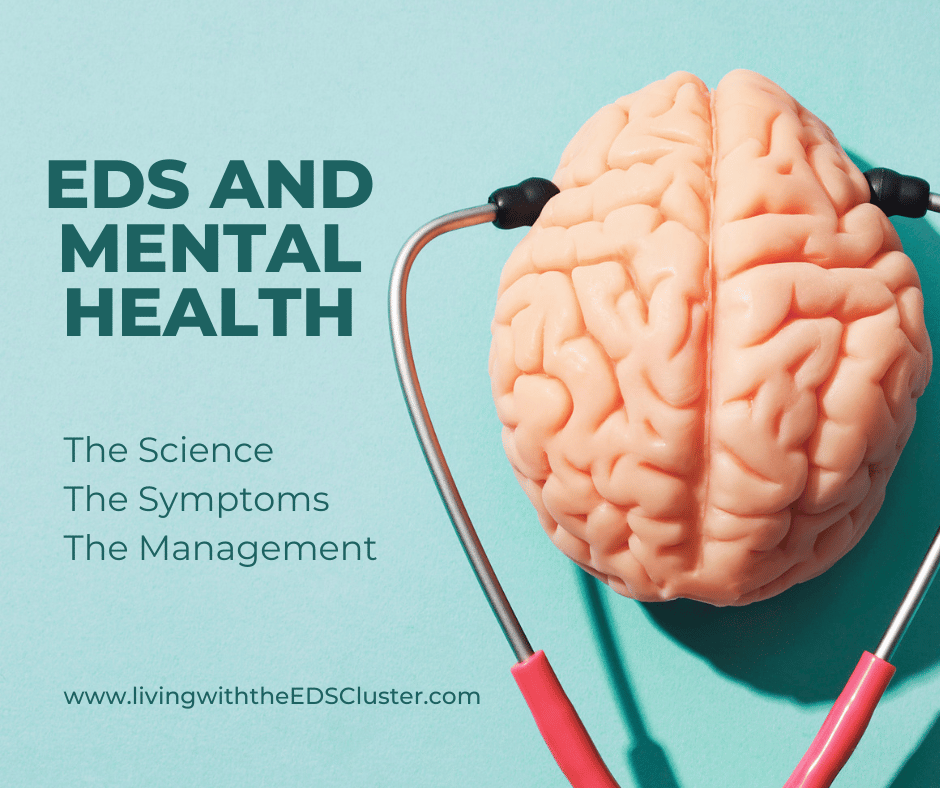One of the most common misconceptions about Ehlers-Danlos syndrome, or EDS, is that it only affects the skin. Unfortunately, this is not the case. EDS can have a profound impact on physical health, as well as mental health.
While most people with EDS are aware of the physical symptoms of the disorder, many are not aware of the mental health complications that can result from living with EDS. This blog will cover common mental health issues like anxiety and depression that people with EDS face, and how they can be managed to improve overall quality of life. We will first start by examining the science behind the link between EDS and mental health issues. We will also discuss how EDS impacts everyone differently and how knowing your triggers can help you cope with symptoms of EDS and mental health. We’ll touch upon how to connect with a support system, seek therapy, and most importantly, how to take care of yourself – physically and mentally – to promote healing and recovery.

What do scientists think is the link between EDS and Mental Health?
The Psychosocial Theory
There are two schools of thought in the medical community when it comes to the directional nature of EDS and mental health issues. The first school of thought is based on psychosocial factors. A great article by Sharp HEC et al. explains it like this:
Through lived experience, the presence of hypermobility from early childhood may directly underpin the development of psychiatric disorders. Excluding neurodevelopmental conditions, this makes temporal sense: The presence and consequences of hypermobility in childhood precedes the typically later emergence of psychiatric disorders in adolescence and adulthood. When symptomatic from a young age, the daily challenges of living with physical risks and difficulties associated with HDS/hEDS (including chronic pain and disability, threat of injury secondary to connective tissue fragility, restriction of social and physical activities and associated stigma) contribute to psychiatric vulnerability, avoidant behaviors and the development of anxiety and depressive symptoms.
Essentially, it says that people with EDS live in pain, and therefore, the pain causes us to develop anxiety and depression. This argument places the direction of correlation to be based on the fact that, we have EDS –> EDS causes chronic pain –> the pain is so hard to handle that we develop anxiety and depression because of it. In other words, the pain causes the mental health issues, not EDS specifically.
The Genetic Theory
Based on that argument, you would expect that those with any type of chronic pain would develop mental health issues at the same rate. If the pain is the cause, it shouldn’t matter what causes the pain, right? However, that is not the case. People with EDS develop mental health issues at a higher rate than those with other chronic pain conditions. Conversely, in the genetic factors school of thought, it is proposed that:
A common set of pathological mechanisms fundamentally predispose to the expression of both hypermobility and psychopathological symptoms (for example, as genetic pleiotropy).
What Sharpe is saying is that it is the genes that cause EDS are also causing the patient’s mental health issues. Unfortunately, the genetic variant that causes hEDS is currently unknown. Until that is defined, we will not be able to clinically prove this theory.
Types of Mental Health Issues Seen in EDS Patients
Just as every person’s EDS is different (like the stripes of a zebra), every EDS person’s mental health issues differ. Mental health disorders that are most commonly associated with EDS are:
- Anxiety: mostly manifests with panic disorder and agoraphobia
- Depression/Affective Disorders: People with EDS see higher rates of affective disorders than the general population
- Eating Disorders: Sharpe points out that, “A proposed model of the relationship between eating disorders and HSD/hEDS recognizes the contribution of both articular (such as temporo-mandibular disorders) and extra-articular features (including gastrointestinal problems, smell and taste abnormalities, dental problems, oral mucosal fragility) to difficult or painful eating, which reinforce dysregulated eating behavior and associated weight loss. Thus HSD/hEDS can plausibly contribute to, mask or even be misdiagnosed as an eating disorder.”
- Personality Disorders (like OCD): it is still unknown what the prevalence of personality disorder is in EDS populations. Initial studies are showing a correlation
- Neurodevelopmental Disorders (ADD, ADHD, ASD, DCD, Tourette’s Syndrome): People with EDS see higher rates of these disorders than the general population
Seeking Professional Help & Self-Care
If you or a loved one have Ehlers-Danlos syndrome (EDS), it’s important to educate yourself about EDS’ impact on mental health, as these two conditions are often linked. You may receive help from a qualified mental health professional who can provide you with diagnosis and treatment.
Given the psychosocial determinants of mental health issues in EDS patients, addressing issues related to your overall health will impact your mental health positively as well. When it comes to self-care, developing a plan for self-care is still a beneficial approach for addressing your mental health issues as well. Common self-care plans for individuals with EDS include physical therapy, exercise, nutrition counseling, and other support services (see some other posts we have about fitness here). It is essential to monitor your symptoms and adjust your plan of care as needed. It is also vital to develop a support system of family, friends, and community resources in order to manage your symptoms and reduce stress. By taking the necessary steps outlined above, you can live a healthy and happy life regardless of the type of Ehlers-Danlos syndrome you have.
Connecting With a Support System
If you are battling mental health issues with EDS, it’s important to connect with a supportive network of family and friends, in addition to your mental health professional. Family and friends can provide emotional support, which can help provide the extra push needed to get through the tough times. You should also consider joining an online or in-person support group for people with EDS. In addition, speaking with a mental health professional about your feelings and experiences can provide valuable insight into your condition and help you better understand yourself. Finally, connecting with others who have mental health issues and EDS can help bring awareness to the disorder and increase understanding of its physical and emotional effects. By taking these steps, you can better manage your symptoms and cope with EDS-related mental health better.
Resources used in this article can be found here:

